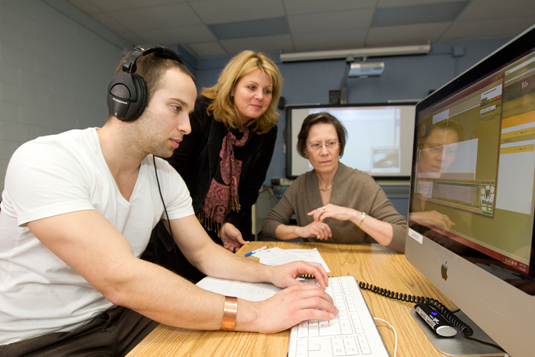Faculty mentor peers in classroom technology

Blogs that draw out quiet students, video chats in French, voice e-mail feedback from a professor, interactive posters created on Glogster, and a wiki on dental materials. The technology that’s now available for the classroom is revolutionizing both teaching and learning.
Proponents insist that technology is critical for the 21st-century classroom, that student engagement has flourished with the use of technology, and that technology gives faculty endless options for student work and assessment. Yet only a small portion of Temple’s faculty are using classroom technology to its fullest extent.
To build the use of technology in Temple classrooms, tech-savvy faculty are mentoring small groups of colleagues through a new year-long program, Faculty Mentors for the Future of Instructional Technology. Organizers believe the project will leverage the strengths of faculty already making great strides with technology by having them share their knowledge with colleagues who are interested but haven’t yet taken the plunge. There are 17 teams of three to four faculty members.
“In developing the program, we asked ourselves: ‘How do we reach beyond the early adopters? How do we get more faculty committed to using technology?’” said Robert Aiken, professor and chair of the Teaching and Learning Technology Roundtable, which created the program.
Part of the challenge is that some faculty are reluctant to try new technology or doubtful about its value.
“Technology also helps us reach different kinds of learners,” said Aiken. “We want to give students the opportunity to learn and to show us what they’ve learned in different ways.”
Keith Quesenberry, an instructor of advertising and one of the 17 mentors, experienced first-hand the power technology has to reach different types of learners. To foster interaction, he requires students to blog and comment on their classmates’ posts.
“During class discussions, you have your outgoing students and your quiet students, and you don’t always have time to get around to everyone,” said Quesenberry. “The blog has leveled the playing field by giving everyone a voice in the class.”
Quesenberry, who is working with three mentees, also saw an increase in student engagement and writing quality, which he attributes to the public nature of the blog.
Another mentor, Wil Roget, chair of the Department of French, German, Italian and Slavic Languages, is working with three mentees to teach French virtually by incorporating video and audio. It is the first time that language instruction at Temple has gone entirely online.
Roget engages students in 30-minute one-on-one video chats at the end of the course.
Activities during the course include interactive writing, speaking and comprehension exercises, compositions, lectures, film and video screenings. He uses the full resources of the virtual classroom to make the study of French accessible to students anytime and anywhere.
Such engagement requires a lot of motivation and organization from students, but Roget believes it has also led to much more learning because students are more engaged and accountable.
As the College of Education has undertaken a complete curriculum revision, Catherine Schifter, associate professor of curriculum, instruction, technology in education, has become a mentor to infuse more technology into the new curriculum. Her mentees are using Glogster, flipcams, blogs, online surveys and voice e-mail.
“We need to be innovative and flexible with technology so that our students can be 21st-century teachers,” said Schifter.
In Dentistry Professor Dan Boston’s basic material sciences class, students analyze product claims about dental materials. In small groups, they make their case on a wiki, which is later opened for comments from the entire class. Boston reports that the project has a strong impact on the students and is very efficient for the teacher. His mentees are using wikis in patient case-based discussions.
Each mentor receives a $2,000 stipend. Many of the mentors (and mentees) will be showcasing their work at Technology Day on April 8. The organizers hope that this year’s mentees will become next year’s mentors, helping technology to proliferate throughout the university.